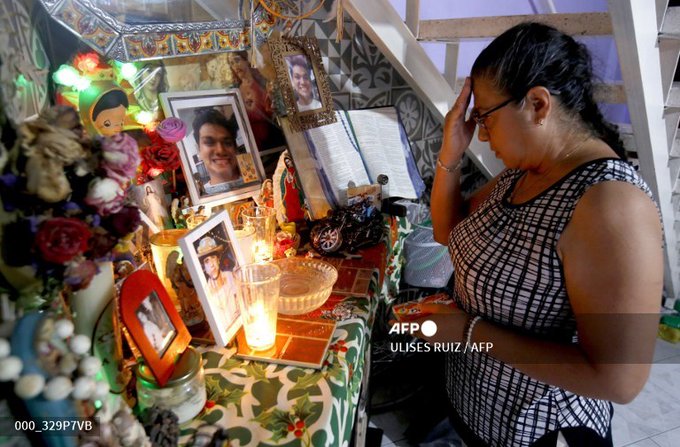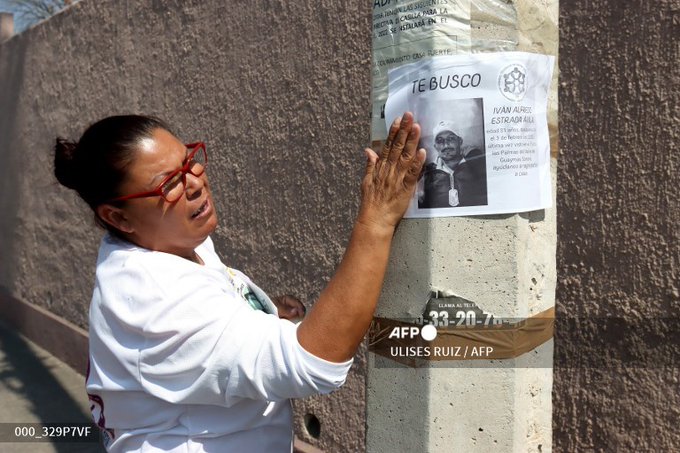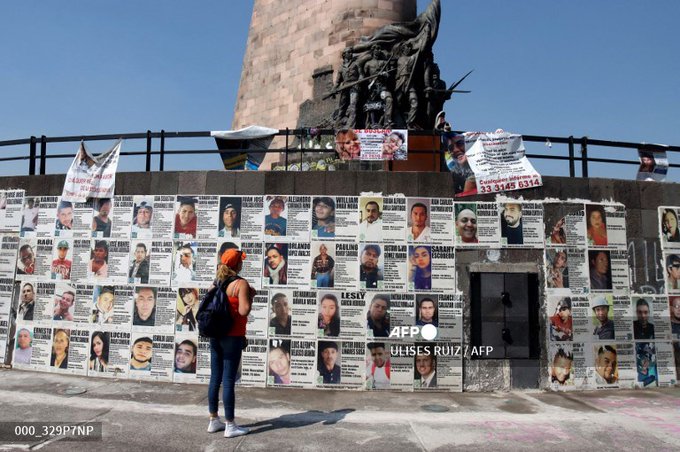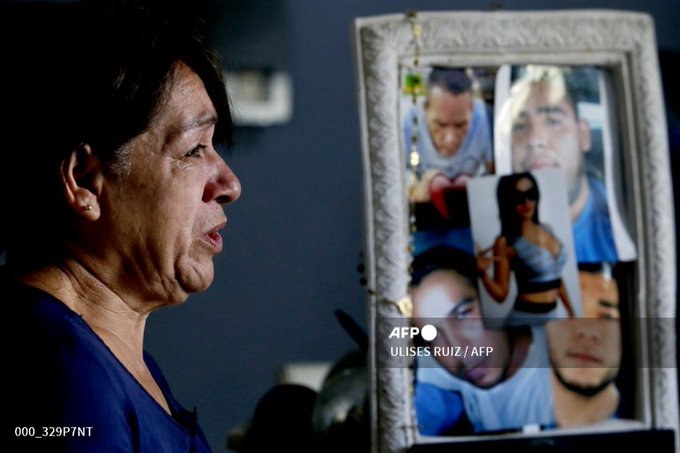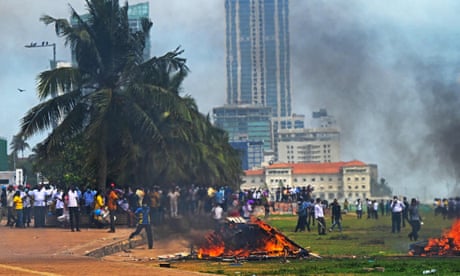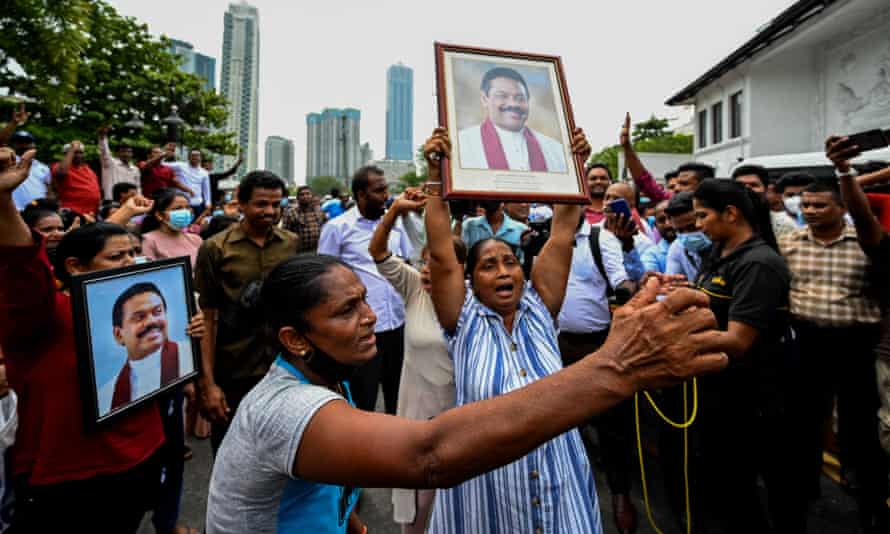
Mexican mother Araceli Hernandez holds a missing persons poster for her daughter Vanessa and son Manuel
(AFP/ULISES RUIZ)
Mireya Blanco
Mon, 9 May 2022,
While most Mexicans celebrate Mother's Day on Tuesday, thousands of women will mark the occasion by continuing their desperate mission to find out what happened to their missing children.
Five of Maria Guadalupe Camarena's nine children are among the more than 95,000 people who have disappeared in the violence-plagued Latin American country.
"There are five empty chairs. There's nothing to celebrate here," said the 61-year-old domestic worker from the western state of Jalisco.
Asked about her plans for Mother's Day, she answered without hesitation: "Look for my children."
Jalisco is the Mexican state with the most missing people -- nearly 15,000.
Camarena's daughter Lucero vanished in 2016 after going to a job interview.
Four of her sons disappeared in 2019 when they were traveling by road to visit a relative and were detained by police.
Although two officers were accused of forced disappearance, they have not been tried and there has been no official search operation.
The United Nations Committee on Enforced Disappearances in April urged Mexico to tackle an "alarming trend" of rising enforced disappearances, facilitated by "almost absolute impunity."
- A mother's mission -
Araceli Hernandez, 50, has photos of her daughter Vanessa and son Manuel, in their 20s, on an altar in her home.
She has not heard from them since 2017 when first Vanessa disappeared and then her brother while he was looking for her.
"They had been missing for about four months when I grabbed a backpack, some bottles of water, a wooden stick and started walking in the hills," Hernandez said.
She joined the growing number of mothers who have formed associations that comb the countryside for clandestine graves that might hold their children's remains.
She also walks the streets of the city of Guadalajara putting up missing person posters, tearfully kissing the images of her son and daughter.
"It's my mission as a mother," she said.
'My life project'
When she wakes up each morning, Rosaura Magana, 61, lights a candle and prays next to a photo of her son Carlos Eduardo.
He disappeared five years ago when armed men who said they were from the prosecutor's office arrived at his workplace and took him away with three others, two of whom were released.
"I never thought this would be my life project," she said of the days she now spends looking for her son instead of enjoying her retirement.
She criticized the authorities for the lack of progress in the case.
The two people who were freed refused to say what happened and the case has gone through six prosecutors and eight investigative police officers, Magana said.
- 'We found nothing' -
Azulema Estrada, 49, has learned on her own about the laws and excavation techniques needed to look for Ivan Alfredo, who disappeared in 2020 aged 30.
Her son was taken by gunmen from his home in the northern state of Sonora along with his partner.
A search of a hillside where their remains are suspected to be buried was unable to cover all the ground, and when lookouts working for drug cartels spotted them it became too difficult to return.
"Unfortunately we found nothing," she said.
In Mexico, even searching for the missing can carry significant risks.
Disappearances began during the Mexican authorities' so-called dirty war against the revolutionary movements of the 1960s-1980s.
They soared after the government launched a military offensive against drug cartels in 2006, since when more than 340,000 people have been murdered in a spiral of violence.
According to the government, there are around 37,000 unidentified corpses lying unclaimed in forensic services, though activists believe the number is more than 50,000.
The authorities aim to use genetic testing to reunite more parents with their children's remains.
But in the meantime, with morgues overflowing, some corpses are buried before they can be identified.
str/sem/dr/mlm/bfm
Mireya Blanco
Mon, 9 May 2022,
While most Mexicans celebrate Mother's Day on Tuesday, thousands of women will mark the occasion by continuing their desperate mission to find out what happened to their missing children.
Five of Maria Guadalupe Camarena's nine children are among the more than 95,000 people who have disappeared in the violence-plagued Latin American country.
"There are five empty chairs. There's nothing to celebrate here," said the 61-year-old domestic worker from the western state of Jalisco.
Asked about her plans for Mother's Day, she answered without hesitation: "Look for my children."
Jalisco is the Mexican state with the most missing people -- nearly 15,000.
Camarena's daughter Lucero vanished in 2016 after going to a job interview.
Four of her sons disappeared in 2019 when they were traveling by road to visit a relative and were detained by police.
Although two officers were accused of forced disappearance, they have not been tried and there has been no official search operation.
The United Nations Committee on Enforced Disappearances in April urged Mexico to tackle an "alarming trend" of rising enforced disappearances, facilitated by "almost absolute impunity."
- A mother's mission -
Araceli Hernandez, 50, has photos of her daughter Vanessa and son Manuel, in their 20s, on an altar in her home.
She has not heard from them since 2017 when first Vanessa disappeared and then her brother while he was looking for her.
"They had been missing for about four months when I grabbed a backpack, some bottles of water, a wooden stick and started walking in the hills," Hernandez said.
She joined the growing number of mothers who have formed associations that comb the countryside for clandestine graves that might hold their children's remains.
She also walks the streets of the city of Guadalajara putting up missing person posters, tearfully kissing the images of her son and daughter.
"It's my mission as a mother," she said.
'My life project'
When she wakes up each morning, Rosaura Magana, 61, lights a candle and prays next to a photo of her son Carlos Eduardo.
He disappeared five years ago when armed men who said they were from the prosecutor's office arrived at his workplace and took him away with three others, two of whom were released.
"I never thought this would be my life project," she said of the days she now spends looking for her son instead of enjoying her retirement.
She criticized the authorities for the lack of progress in the case.
The two people who were freed refused to say what happened and the case has gone through six prosecutors and eight investigative police officers, Magana said.
- 'We found nothing' -
Azulema Estrada, 49, has learned on her own about the laws and excavation techniques needed to look for Ivan Alfredo, who disappeared in 2020 aged 30.
Her son was taken by gunmen from his home in the northern state of Sonora along with his partner.
A search of a hillside where their remains are suspected to be buried was unable to cover all the ground, and when lookouts working for drug cartels spotted them it became too difficult to return.
"Unfortunately we found nothing," she said.
In Mexico, even searching for the missing can carry significant risks.
Disappearances began during the Mexican authorities' so-called dirty war against the revolutionary movements of the 1960s-1980s.
They soared after the government launched a military offensive against drug cartels in 2006, since when more than 340,000 people have been murdered in a spiral of violence.
According to the government, there are around 37,000 unidentified corpses lying unclaimed in forensic services, though activists believe the number is more than 50,000.
The authorities aim to use genetic testing to reunite more parents with their children's remains.
But in the meantime, with morgues overflowing, some corpses are buried before they can be identified.
str/sem/dr/mlm/bfm

